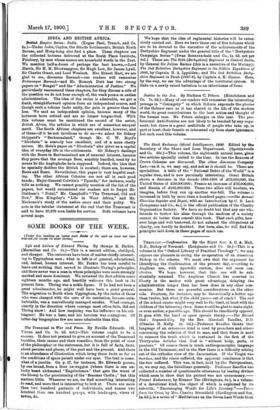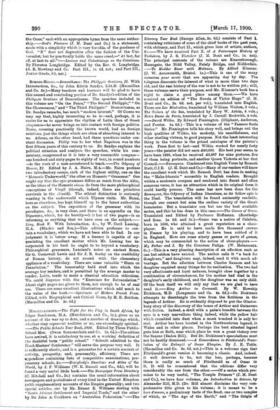THEOLOGY.—Ccnifirmation. By the Right Rev. A. C. A. Hall, D.D.,
Bishop of Vermont. (Longmans and Co. 5s.)—This is a volume in the "Oxford Library of Practical Theology "; we may express our pleasure in seeing the co-operation of an American Bishop in the scheme. We must own that the argument for identifying the Confirmation of the present day, according to Anglican use, with Apostolic custom, does not seem con- clusive. We hope, however, that this use will be sub- stantially retained. The Anglican Church has asserted its liberty in the matter with great advantage, delaying the administration longer than has been done in any other com- munion. But there are powerful considerations on the other side. Fourteen, for instance, may be theoretically a better age than twelve, but what if the child passes out of reach ? The end of the school course might very well be the limit, at least with the children of the labouring class. Some would be glad to make eight, or even earlier, a possible age. This should be steadfastly opposed. It goes with the hard ex opere operato theory.—The Blessed God : Impassibility. By the Rev. Marshall Bandies, D.D. (Charles H. Kelly. 2s. 61)—Professor Randles thinks that language of an erroneous kind is used by preachers and others concerning the relation of God to man, and that there is need to reassert the truth which is contained in the first of the Thirty-nine Articles that God is " without body, parts, or passions." Of course there is much anthropomorphic language in the Old Testament, and in the New there is a difficulty arising out of the orthodox view of the Incarnation. If the Virgin was 'hyraces, and the eievov suffered, the apparent conclusion is that the Ws suffered. This was, in fact, held by the Patripassians, or, we may say, the Sabellians generally. Professor Handles has collected a number of questionable utterances by leading divines which seem to show that his protest was not unnecessary.— Present Endurance, by Eleanor Tee (Rivingtons, 6s.), is a volume of a devotional kind, the object of which is explained by its sub-title, " Encouraging Words for Life's Journey."—VoiceR from the Cross, by Mrs. Charles Streatfield (Skeffington and Son, ls. W.), is a series of " Meditations on the Seven Last Words from the Cross," each with an appropriate hymn from the same author- ship.—God's Pleasure (J. M. Dent and Co.) is a statement, made with a simplicity which is very forcible, of the goodness of God. "B" does not dogmatise after the fashion of the Uni- versalist, but he practically holds the same creed,—" At last, far off, at last to all."—Lessons and Catechisings on the Catechism. By Florence Longbridge. Edited by the Rev. G. Longbridge. (A. R. Mowbray and Co. Part III., ls. 6d. net; and Part III., Junior Grade, 63. net.)

































 Previous page
Previous page